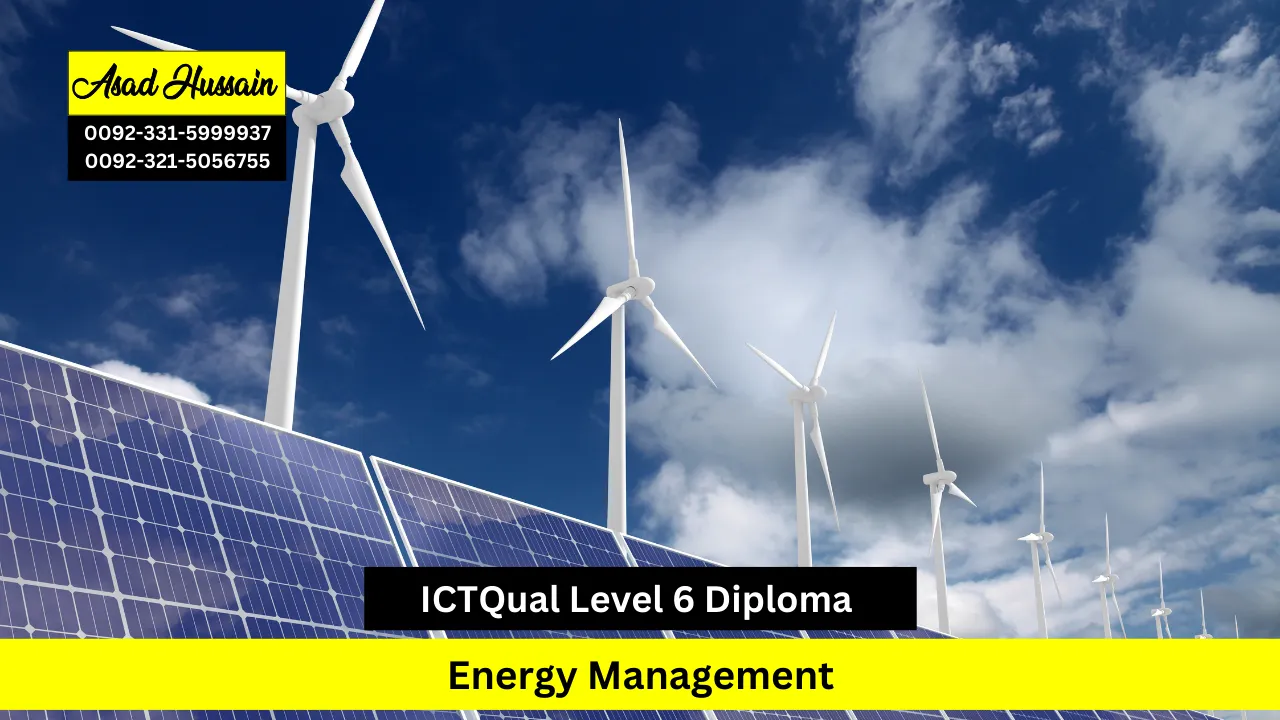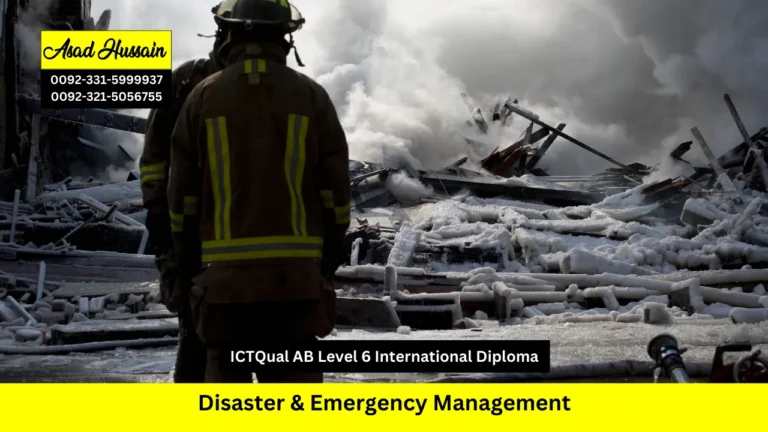As organizations worldwide face increasing pressure to reduce energy costs, enhance sustainability, and comply with environmental regulations, effective energy management has become a critical strategic priority. The ICTQual Level 6 Diploma in Energy Management is an advanced program designed for professionals and managers seeking to develop expert knowledge and applied skills in energy efficiency, renewable technologies, and sustainability initiatives. This course empowers learners to lead energy projects, optimize operational performance, and implement innovative energy strategies across diverse industries.
The ICTQual Level 6 Diploma in Energy Management covers a comprehensive range of topics, including energy performance analysis, operational energy management, renewable energy integration, sustainability practices, regulatory compliance, and strategic planning. Learners will gain both theoretical understanding and practical experience, enabling them to evaluate energy systems, identify improvement opportunities, and develop actionable solutions that align with organizational goals and international sustainability standards.
Through case studies, applied projects, and industry-focused workshops, participants will develop critical thinking, problem-solving, and leadership skills necessary for managing energy projects effectively. The ICTQual Level 6 Diploma in Energy Management also emphasizes understanding energy policies, regulatory frameworks, and financial considerations, ensuring graduates are prepared to make informed, strategic decisions that deliver measurable benefits.
Graduates of the ICTQual Level 6 Diploma in Energy Management will be equipped to assume senior roles such as Energy Manager, Sustainability Coordinator, Energy Consultant, or Operations Manager, leading initiatives that drive energy efficiency, reduce costs, and support long-term environmental sustainability. By combining advanced technical knowledge with practical application, this diploma prepares professionals to contribute meaningfully to organizational energy goals while enhancing career growth and industry impact.
Program Highlights
Study Units
- Introduction to energy management
- Technical and Operational
- Behavioural Change and Motivation
- Waste Management
- Procurement
- Energy Assessments, Measurements and Verification
- Regulatory & Legal Compliance and Carbon Management
- Strategy/Plan in energy management
To enroll in the ICTQual Level 6 Diploma in Energy Management, applicants must meet specific academic, professional, and language criteria. These requirements ensure learners are equipped to engage with advanced concepts in energy strategy, efficiency, and sustainability, preparing them for senior roles and strategic responsibilities in energy management.
Age Requirements
- Applicants should be at least 20 years old to enroll in the program.
- Mature learners with relevant professional experience are encouraged to apply.
Educational Requirements
- A bachelor’s degree or equivalent qualification in engineering, environmental science, energy management, or a related discipline is preferred.
- Candidates with advanced professional certifications or prior energy management coursework may also be considered.
Professional Experience
- A minimum of 2–4 years of professional experience in energy management, sustainability, facilities management, or related fields is recommended.
- Applicants should demonstrate experience in implementing energy efficiency projects, monitoring energy performance, or supporting organizational sustainability initiatives.
English Language Proficiency
- Non-native English speakers must provide proof of English proficiency, such as IELTS (minimum 5.5) or an equivalent qualification.
- Evidence of prior education or professional experience in English-medium environments may also be accepted.
The ICTQual Level 6 Diploma in Energy Management is designed to equip learners with advanced technical knowledge, strategic insight, and practical skills to manage energy resources efficiently. Graduates will develop the ability to lead energy initiatives, implement sustainability strategies, and ensure compliance with industry regulations. The program combines theoretical learning with applied practice, preparing learners for senior and strategic roles in energy management.
Introduction to Energy Management
- Understand the fundamental principles of energy systems, including operational and strategic aspects.
- Analyze energy consumption patterns to identify opportunities for efficiency improvements.
- Develop frameworks for implementing effective energy management programs.
- Apply best practices in organizational energy planning and monitoring.
- Gain insight into global standards and industry benchmarks for energy management.
Technical and Operational
- Evaluate technical energy systems and their operational performance.
- Implement strategies to optimize energy usage in industrial, commercial, and residential contexts.
- Understand energy system integration, including HVAC, lighting, and mechanical systems.
- Develop practical skills to monitor, control, and improve operational efficiency.
- Assess the impact of operational changes on energy consumption and cost savings.
Behavioural Change and Motivation
- Identify methods to encourage energy-conscious behavior among employees and stakeholders.
- Develop communication strategies to promote sustainability and energy efficiency initiatives.
- Evaluate the effectiveness of behavioral interventions on energy performance.
- Integrate motivational techniques into organizational energy policies.
- Apply tools for measuring the impact of behavioral change programs.
Waste Management
- Understand principles of waste management, recycling, and resource optimization.
- Analyze organizational waste streams to identify efficiency opportunities.
- Implement strategies to reduce, reuse, and recycle waste effectively.
- Evaluate cost and environmental benefits of sustainable waste management practices.
- Apply best practices for waste monitoring and reporting.
Procurement
- Assess energy-efficient procurement options for equipment, materials, and services.
- Integrate sustainability criteria into supply chain and procurement decisions.
- Evaluate the impact of procurement choices on energy efficiency and carbon footprint.
- Develop strategies for supplier engagement in energy and sustainability initiatives.
- Apply procurement policies to support organizational energy goals.
Energy Assessments, Measurements, and Verification
- Conduct energy audits and performance assessments to identify improvement areas.
- Apply measurement and verification techniques to ensure accurate energy data collection.
- Develop reporting frameworks for energy consumption and efficiency projects.
- Analyze energy assessment results to inform decision-making.
- Ensure compliance with organizational and regulatory requirements through accurate verification.
Regulatory & Legal Compliance and Carbon Management
- Understand relevant energy legislation, standards, and regulatory requirements.
- Develop strategies to ensure compliance with local, national, and international regulations.
- Implement carbon management practices, including measurement, reduction, and offsetting.
- Evaluate the impact of regulatory compliance on organizational energy performance.
- Apply legal and carbon management frameworks to enhance sustainability outcomes.
Strategy/Plan in Energy Management
- Design comprehensive energy management strategies aligned with organizational goals.
- Develop strategic plans for efficiency improvements, renewable integration, and carbon reduction.
- Apply risk assessment and scenario planning to optimize energy operations.
- Evaluate strategy effectiveness through key performance indicators and continuous improvement.
- Integrate technical, financial, and regulatory considerations into strategic energy planning.
Conclusion
Upon completing the ICTQual Level 6 Diploma in Energy Management, learners will possess advanced technical, strategic, and managerial expertise required for senior roles in energy management and sustainability. Graduates will be equipped to lead organizational energy initiatives, optimize operational performance, and implement strategic solutions that deliver measurable cost savings, environmental benefits, and long-term organizational value.
The ICTQual Level 6 Diploma in Energy Management is designed for professionals and aspiring leaders seeking to develop advanced expertise in energy efficiency, sustainability, and strategic energy management. This program is ideal for individuals aiming to implement energy initiatives, optimize organizational performance, and contribute to sustainability goals while progressing into senior roles in the energy sector.
Educational Instructors and Trainers
- Academics and trainers teaching energy management, sustainability, or environmental science courses seeking to enhance curriculum with advanced technical and strategic insights.
- Professionals aiming to deliver applied learning sessions or workshops focused on energy efficiency, renewable energy, and organizational sustainability.
Environmental Advocates and Activists
- Individuals involved in environmental NGOs, advocacy, or sustainability programs aiming to gain advanced technical knowledge to support energy efficiency initiatives.
- Activists looking to apply energy management principles in community projects, campaigns, or policy initiatives.
Students and Recent Graduates
- Graduates in engineering, environmental science, energy management, or related disciplines seeking to specialize in energy management and sustainability.
- Learners looking to gain practical, industry-relevant skills to enhance employability in energy-focused roles.
Career Changers
- Professionals from other industries wishing to transition into energy management, sustainability, or environmental leadership roles.
- Individuals seeking a recognized Level 6 qualification to support career advancement and strategic responsibility in energy-related projects.
Policy Makers and Regulators
- Government officials, regulators, and policy advisors involved in energy, sustainability, or environmental regulation seeking technical and strategic knowledge.
- Professionals aiming to design, implement, and monitor energy policies, compliance frameworks, and carbon management initiatives.Conclusion
This program is ideal for learners committed to advancing their careers in energy management and sustainability. Graduates will gain the technical expertise, strategic insight, and leadership skills required to drive energy efficiency initiatives, implement sustainability strategies, and lead organizational energy projects with measurable environmental and economic impact.







